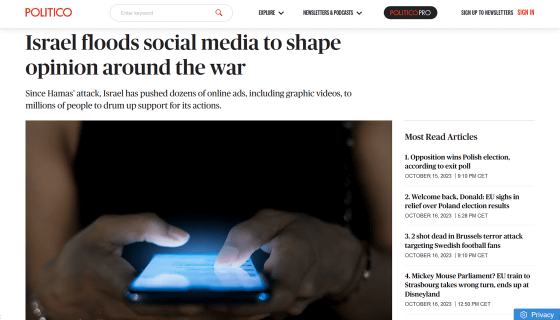Israel is running an advertising campaign on X (formerly Twitter) and YouTube that includes extreme content calling ``Hamas a brutal terrorist group.''

On October 7, 2023, Hamas, an extremist organization that effectively controls the Gaza Strip, invaded Israel, and a large-scale military conflict occurred with Israel in response. At the time of writing,
Israel floods social media to shape opinion around the war – POLITICO
https://www.politico.eu/article/israel-social-media-opinion-hamas-war/

Since the military conflict between Israel and Hamas broke out, social networking sites such as X (formerly Twitter) have posted that ``Hamas fighters attacked Israeli villages and residences and brutally massacred many people, including babies.'' Information is out there. Accounts that report on the brutal situation on the ground are not only those of ordinary people living in the area and journalists, but also the Israeli Ministry of Foreign Affairs, which also posts images and videos of Hamas' actions.
POLITICO reported that Israel's Ministry of Foreign Affairs is not only posting posts denouncing Hamas, but also running an extensive social media campaign to spread the posts as 'advertisement.' Advertisements promoting Israel's claims are being distributed on X and YouTube, and are said to target major Western countries such as Europe and the United States.
Many of the posts from the Israeli Ministry of Foreign Affairs are accompanied by cruel and emotionally charged images and videos, but some, like the one below, combine fancy images with messages. The summary section says, ``Children cannot read the text in this video, but parents can. 40 infants were killed by Hamas terrorists. We want you to protect your children.'' 'I know we will do everything we can to help. That's what we're going to do.' The text in the video reads ``HAMAS TERRORIST (ISIS),'' and the Israeli Ministry of Foreign Affairs is promoting Hamas as the same name as ISIS (Islamic State), which is well known in Europe and America.
Babies Can't Read The Text In This Video But Their Parents Can - YouTube
Information warfare has long been used in wars and conflicts to win over public opinion to one's side, but in recent years the front lines of information warfare have been moving online, and this is especially evident in the war between Ukraine and Russia that will begin in 2022. was. Israel's ad campaign shows that spending money on online advertising that targets specific countries and demographics is an important way for governments to get their messages across to more people. Masu.
According to data from the X advertising platform, the Israeli Ministry of Foreign Affairs posted as many as 30 advertisements in one week, which were viewed more than 4 million times in total. The ad, which began appearing on October 12, targets adults aged 25 and older in Brussels (Belgium), Paris (France), Munich (Germany), and The Hague (Netherlands), and the video contains It included an image of a lifeless woman in a pickup truck, demonstrating the scale and nature of the massacre.
In addition, over 75 different advertisements are distributed on YouTube by the Israeli Ministry of Foreign Affairs, some of which include graphic images and videos. According to Google's transparency database, the ads are still targeting viewers in Western countries such as France, Germany, the United States, and the United Kingdom.
A spokesperson for Israel's EU mission said: 'We never posted something this graphic before. This is not in our culture. We respect the deceased. 'War doesn't just happen on the ground,' he said, expressing the view that advertising campaigns are necessary to advance military operations advantageously, although it is difficult.

Israel's advertising campaign with extreme content has challenged platforms that set standards for the content they can distribute. For example, after being contacted by POLITICO for comment, Google removed about 30 ads that contained violent images from its ad library, including 'violent language, gruesome or disgusting images, graphic images, and descriptions of physical trauma.' Ads that contain are not allowed.' On the other hand, similar advertisements were not posted on Instagram, Facebook, LinkedIn, or TikTok.
Ads related to violence and brutality are causing
Thierry Breton , the European Commissioner in charge of the EU's digital services law , has also called on some platforms to do more to protect young users from harmful content, and has announced that Israeli advertising will be subject to regulation. There is a possibility that it will happen.
While Israel is running an online advertising campaign, POLITICO points out that it is difficult for Hamas and pro-Palestinian groups to run similar advertising campaigns in the Gaza Strip, where air strikes have caused extensive damage to infrastructure. 'It's hard to imagine a stronger counter-messaging effort by a pro-Palestinian group with access to the same advertising medium,' Brooking said. 'This is one area where Israel really has an advantage on the social media battlefield.' said.

However, it is clear that Hamas is also engaged in social media and online appeals. Although Hamas is banned from major social networking sites such as X and Facebook, it posts radical messages on the messaging app Telegram. These posts have been reposted by other users on major social networks, spreading Hamas' claims on various social networks.
Hamas uses Telegram to give its version of war with Israel - The Washington Post
https://www.washingtonpost.com/technology/2023/10/18/hamas-social-media-terror/
When an explosion occurred at a hospital in northern Gaza on October 17, Hamas immediately posted a message condemning Israel, which stirred anti-Israel sentiment in neighboring countries. Hamas fighters carry smartphones around with them to take various videos on the battlefield, and footage shot by GoPros they wear is also quickly posted on Telegram, clearly showing that they are focusing on their social media strategy. It has been reported.
Related Posts:
in Web Service, Video, Posted by log1h_ik







